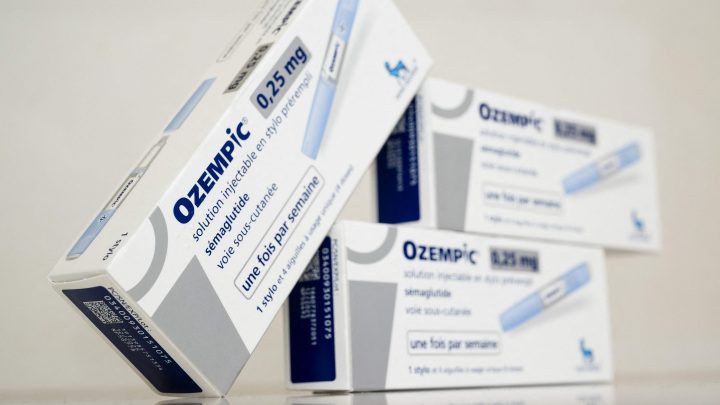
Why doesn’t Medicare cover drugs like Ozempic for weight loss?
Share Now on:
Why doesn’t Medicare cover drugs like Ozempic for weight loss?

Medicare Part D, which provides prescription drug coverage, will now cover the weight-loss medication Wegovy in cases where the patient is at risk of a heart attack or a stroke.
Wegovy belongs to a group of drugs known as GLP-1s — which include Ozempic and Mounjaro — that were developed for those with type 2 diabetes to manage their blood sugar, and have now become a popular choice of drug to help with weight loss. The U.S. Food and Drug Administration has not approved Ozempic and Mounjaro for weight loss, although it has approved Wegovy and a version of Mounjaro called Zepbound.
Medicare beneficiaries have access to drugs like Ozempic if they’re being used to treat diabetes. But Medicare Part D does not provide coverage for GLP-1s if you’re just trying to lose weight, said John Cawley, a professor of economics and public policy at Cornell University. He noted this means a high percentage of Medicare recipients who have obesity won’t be able to get access to these weight loss drugs.
While Cawley says these drugs could provide health benefits for these patients, there is a law, called the Medicare Modernization Act of 2003, that prohibits coverage of weight-loss drugs.
This ban is a stronger version of 1990 Medicaid rules, which gave states the option to prohibit coverage of weight-loss drugs, fertility drugs and cosmetic drugs. Some weight-loss drugs in the past, not GLP-1s, were ineffective or “downright dangerous,” which is why states were allowed to exclude them, Cawley noted.
Cawley said that lawmakers have introduced the Treat and Reduce Obesity Act, a law that would allow Medicare Part D to cover drugs like GLP-1s to treat obesity. However, it has failed to be enacted.
“Part of it is cost,” Cawley said. “The list prices are over $1,000 a month.”
James Bailey, an associate professor of economics at Providence College, said Medicare receives rebates that bring down the price, but the drugs are still very expensive.
The Kaiser Family Foundation found that in 2022, Medicare spent $5.7 billion on Ozempic and other drugs used to treat diabetes — a drastic increase from $57 million in 2018.
Jeah Jung, a professor of health administration and policy at George Mason University, said Part D’s coverage of Wegovy could increase the Medicare Part D costs, in turn increasing premiums.
But it’s unclear how much it’ll impact Part D and when we’ll see those effects, Jung said.
Jung pointed out that reducing the risk of cardiovascular disease could save medical costs in the future.
Cawley said the Congressional Budget Office looked at the cost of providing Medicare coverage of anti-obesity medications to patients, and found that the cost of GLP-1s would fail to be fully offset by other health care savings.
But Cawley said it still could potentially be a great benefit for society. “Not everything saves money that’s worthwhile,” he said. Cawley said he remains cautious about GLP-1s because there may be side effects we don’t know about, but he noted they’ve been prescribed since 2005 and have shown to reduce cardiovascular risk.
Demand for these drugs is so high that Costco is now providing Ozempic prescriptions with its health care partner, Sesame, for a $179 three-month plan that includes a video consultation, a GLP-1 prescription if needed and access to a health care provider, reported CNN. But the cost of the weight-loss drugs are not included in the $179, and Cawley questions whether this is the best way of obtaining the drug because you may want to go for an in-person check-up so you can find out if you have any obesity-related medical conditions.
Sen. Bernie Sanders of Vermont has criticized the high cost of Ozempic, pointing out in a press release that it costs at most $5 a month to manufacture the drug. That’s based on a study from Yale University, King’s College Hospital in London and Doctors Without Borders.
Cawley said the weight-loss drug space is becoming more competitive, which means prices could drop. For example, he said the pharmaceutical company Eli Lilly and Company recently released the weight-loss drug Zepbound.
Under the 2022 Inflation Reduction Act, the government is now able to directly negotiate drug prices with drugmakers. Late last year, the Biden administration released the first 10 drugs subject to negotiation. Ozempic could be next.
There’s a lot happening in the world. Through it all, Marketplace is here for you.
You rely on Marketplace to break down the world’s events and tell you how it affects you in a fact-based, approachable way. We rely on your financial support to keep making that possible.
Your donation today powers the independent journalism that you rely on. For just $5/month, you can help sustain Marketplace so we can keep reporting on the things that matter to you.












